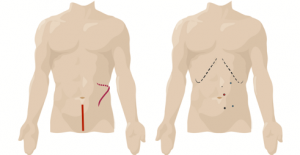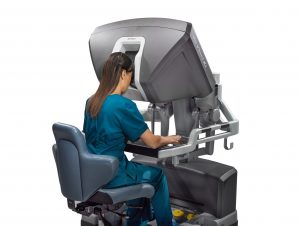A “robotic assisted nephroureterectomy” (RANU) is a minimally invasive surgical procedure performed to treat suspected or confirmed upper urothelial tract cancer (cancer in the lining of the collecting system which drains the kidney). The aim of this operation is to remove the entire kidney and ureter (tube that drains urine from the kidney to the bladder).

The operation is performed using “keyholes” and using the latest da Vinci® Xi robotic surgical system.
The benefits of the robotic approach include:
- Less pain
- Less blood loss
- Shorter length of stay (1-3 days)
- Faster recovery to normal activities (1-2 weeks)
- Faster return to work (2-6 weeks depending on occupation)
- Better dexterity and reach of instruments resulting in ability to perform the entire operation in one position with minimal incisions and less overall time
WHAT DOES THE PROCEDURE INVOLVE?
Once the anaesthetic is delivered the patient, asleep, is placed on the operating table and prepped. A catheter is placed into the bladder. “Keyhole” incisions are made in a line around the level of the belly button, to allow insertion of hollow tubes (cannulas) into the abdomen. Gas is then pumped into the abdomen to obtain a good view around the kidney and ureter. The robot arms are then “docked” (attached) to these cannulas and instruments which will be used to perform the procedure are inserted. The surgeon then controls the instruments remotely (via the “surgical console”) to complete the operation. A surgical assistant and scrub nurse assist at the bedside with changing instruments and inserting/ removing sutures.
 The blood vessels supplying the kidney are identified and clamped. The kidney and the entire length of the ureter are mobilised down to the bladder. A small cuff of bladder is excised and the defect is closed with an absorbable suture. The whole specimen is the removed through a small extension of one of the keyhole incisions and the wounds are closed with absorbable sutures. The specimen is sent to the laboratory to be analysed by a specialist pathologist. The patient generally wakes up soon after the procedure in recovery, and if stable goes to the intensive care or surgical ward.
The blood vessels supplying the kidney are identified and clamped. The kidney and the entire length of the ureter are mobilised down to the bladder. A small cuff of bladder is excised and the defect is closed with an absorbable suture. The whole specimen is the removed through a small extension of one of the keyhole incisions and the wounds are closed with absorbable sutures. The specimen is sent to the laboratory to be analysed by a specialist pathologist. The patient generally wakes up soon after the procedure in recovery, and if stable goes to the intensive care or surgical ward.


HOW DO I PREPARE BEFORE MY PROCEDURE?
- Appointment with clinical nurse specialist – you will have a 1-hour appointment with our practice nurse to discuss in detail your upcoming surgery, pre-operative investigations (blood and urine tests, ECG), admission instructions, what to expect following the operation as well as address any of your concerns.
- Blood thinners – these include aspirin, clopidogrel (Plavix), warfarin, rivaroxaban (Xarelto), apixaban (Eliquis), dabigatran (Pradaxa) and need to be stopped 2-10 days prior to your surgery. Your doctor will advise you further about this.
- Other regular medications – you can take all of these, up to and including the day of your surgery, unless otherwise instructed by your doctor.
- Fasting and admission – the hospital will call you the day prior to give you fasting instructions and when/where to come into hospital (please click here for contact details in the event you do not receive this call)
WHAT CAN I EXPECT IN HOSPITAL AFTER THE PROCEDURE?
- A urinary catheter. This is usually removed before you are discharged from hospital (after 2 or 3 days).
- A drain tube coming out of the abdomen connected to a collection bag (this is used to monitor for bleeding and urine leak and is usually removed 1-2days after the surgery.
- Abdominal pain especially with moving/coughing. You will have some regular pain relief charted, but if needed please ask the nurse looking after you for extra pain killers. You may have a PCA (patient controlled analgesia) for 24 hours, which is essentially a button you press when you need some pain relief. The aim is not to be pain free but to reduce pain levels in order to ensure you pain is under control so that you are able to take deep breaths and cough.
- Gas under the skin (like bubble wrap) and bloating – this normal and should resolve within a few days
- Shoulder tip pain is common and as a result of gas irritating the diaphragm.
- You will be allowed to have fluids as soon as you are alert after your operation and in most cases be able to eat food the day after
- Nausea is common for the first 24 hours after anaesthetic and treated with anti-nausea medications if required.
- Your bowels may be sluggish and not open for a few days, but as long as you are tolerating oral intake and passing wind, there is no need to be concerned.
The aim before discharge is for you to be able to:
- Tolerate a normal diet without nausea
- Pass wind through the back passage
- Pain be under control with tablets
- Be able to transfer in and out of bed and walk around
- If you are discharged with a catheter, you will need to be able to manage it on a leg bag.
WHAT CAN I EXPECT AFTER I AM DISCHARGED?
- A follow-up appointment for you to see your doctor (in 2-3 weeks) or to have your catheter removed (if you were discharged with one)
- Pain should decrease day by day and need for pain killers should also reduce
- Bowels should start working as normal (see below about diet)
- Wound care – you will have waterproof (ie. shower as normal) dressings and steri-strips over your wounds. These can be removed and checked around 1 week after surgery. The sutures are all absorbable and do not need to be removed.
WHAT ABOUT DIET?
- Drink plenty of fluids (8-10 glasses or 2-3 litres)
- Ensure adequate nutrition to improve healing. You may need to have 6 smaller meals rather than 3 larger ones.
- Eat a diet high in fibre to prevent constipation and the need for straining when using your bowels
- Take laxatives (eg. coloxyl and lactulose) as directed
WHAT ABOUT EXERCISE/ACTIVITY?
- You can do gentle exercise such as walking less than 1.5km
- Avoid strenuous activity, heavy lifting (>3kg) or engage in sports (eg. golf) for 6 weeks to prevent wound complications such as hernias
- Avoid driving a car until you have no pain and not on any pain killers (about 2 weeks)
- Returning to work depends on the physical demands of your duties. You may be able to return to low physical activity jobs (eg. office work) within 3-4 weeks. You may need 6-12 weeks off jobs involving heavy manual work.
- Avoid overseas travel for 6 weeks (inform your Doctor if you have a trip planned)
WHAT ABOUT MEDICATIONS?
- You can resume your usual medications
- If your blood thinning medication was stopped, your Doctor will let you know when to recommence
- You can take 1-2 paracetamol every 4-6 hours for pain and discomfort (no more than 8 in a day)
- Stronger pain medications may also have been prescribed and should be taken as directed. Their use should decrease every day, as taking them in the long term will often cause side effects such as constipation.
WHAT ARE THE POSSIBLE SIDE EFFECTS/COMPLICATIONS?
Occasional/Uncommon
- Bleeding – requiring blood transfusion or repeat surgery
- Ileus – slowing of bowels causing vomiting and constipation
- Urine infection
- Wound infection
- Recurrence of cancer in the bladder, around where the kidney was removed or metastases (spread to other organs)
Rare
- Urine leak – usually managed with prolonged period with drain and/or catheter
- Conversion to open procedure (bigger incision)
- Anaesthetic, cardiovascular or perioperative problems possibly requiring intensive care admission (including chest infection, pulmonary embolus – blood clot in lungs, deep vein thrombosis – blood clot in leg, stroke, heart attack and death)
- Hernia involving any of the wounds requiring further treatment
- Injury to other organs (eg. bowel, liver, spleen, pancreas, lung) during surgery
NOTIFY GM UROLOGY or your GP if you experience any of the following:
- Increased pain, redness or purulent discharge from any of the wounds
- Increased discomfort, severe abdominal/flank pain or bloating
- Vomiting
- Worsening burning when passing urine
- Fever (temperature over 37.5 degrees), chills, shakes or feeling generally unwell
FOLLOW UP APPOINTMENT
You should have an appointment to see your doctor in 2-3 weeks. If this appointment time is not given to you on discharge from hospital, please phone GM Urology.
If you have any queries please contact GM Urology on 03 5201 7000 during business hours OR leave a message on the After Hours Urology Paging Service 03 9387 1000



